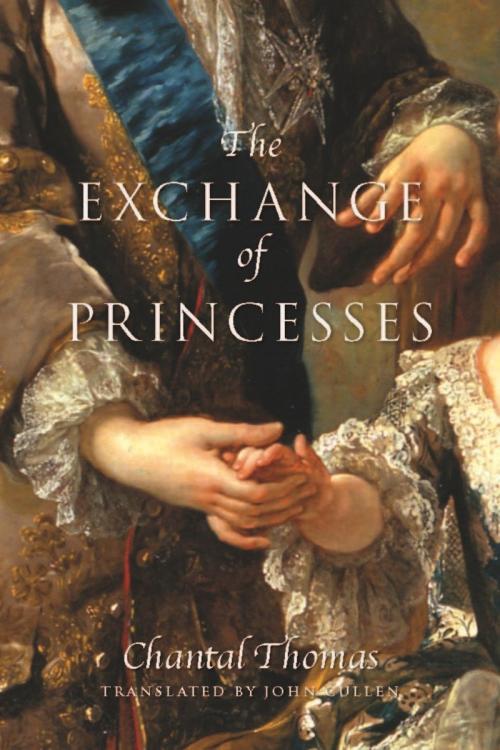“This is one vivid, engrossing, weird little book…[O]ne of the most fascinating historical narratives I’ve ever read.” —Diana Gabaldon, The Washington Post
“A meticulous and vivid chronicle.” —Kirkus Reviews
“This exchange of princesses is delivered with cool-eyed cinematic detail…A brightly polished portrait of royal pomp and custom for historical fiction fans with big-picture tastes.” —Library Journal
“[Chantal] Thomas has crafted a pointed and witty novel that sheds light on two eighteenth-century princesses trapped by familial obligations and the capricious whims of the court.” —Booklist
“Chantal Thomas evokes with passion and clarity the cruel fates of two princesses exchanged for the greatest glory of France and Spain and treated like inanimate pawns. She evokes the four-year old infanta uprooted and parachuted to Versailles only to be disdained by her royal fiancé, and gives a moving and glowing portrait of the French princess who refuses to submit to the harsh demands of the royal Spanish family. A rare and beautiful example of distant history brought back to life with verve and feeling.” —Anka Muhlstein, author of Monsieur Proust’s Library
“King Louis XV plays at war; the Queen Infanta of France plays at dolls. He is eleven; she is four. Chantal Thomas has written a shocking and brilliant historical account of two sets of royal alliances—or, more accurately, misalliances—written with verve, irony and whimsy—even the Infanta’s dolls weigh in on this absorbing tale of unrequited conjugal love and political venality.” —Lily Tuck, author of I Married You for Happiness
“Two child princesses may be pawns in a ruthless game of state, but they triumph as characters [through whom we witness the absurdities of fate] in Chantal Thomas’s shrewdly observed and hugely entertaining novel of 18th century Spain and France.” —Molly Haskell, author of My Brother My Sister: Story of a Transformation
“It’s a grim tale of the abuse of children for royal purposes, entertainingly told. A gripping and eventful novel, sad and at times amusing.” —Martha Saxton, writer and professor of History and Women’s Studies at Amherst College
“[Readers will] devour this story like a fairy tale.” —Elle (France)
“The exchange of these princesses is straight out of a Cold War spy novel, taking place on an island in the middle of a river that serves as the border between the two kingdoms. But none of these young protagonists will play the adults’ game and the princesses will end up going home. Chantal Thomas excels at humanizing history and exposing what is at stake (or ‘revealing its relevance’). How do these children, sold in such a way by their parents, feel? Will they love or hate each other? These are the universal, timeless, questions, that this ‘historical’ novel plays with, and which render it strikingly contemporary.” –Vogue (France)
“We love [The Exchange of Princesses] because, as always with Chantal Thomas, winner of the 2002 Prix Femina for Farewell, My Queen, her stories dance on volcanoes. In her, the mighty of our world finish by bumping their noses against the whims of fate…A must-read if you still shy away from historical novels. That will change.” —Le Parisien
“Delicious like childhood and cruel like life.” —Télérama
“Chantal Thomas made history a pungent, political, and intimate epic, told by a narrator whose empathy does not detract from the satirical irony.” —Le Magazine littéraire
“[With this] little known episode in history, Chantal Thomas writes a superb novel about violence against women and children, [showcasing] marriages as absurd as they are forced.” —Phosphore
“Impressive.” —La Vie
“A fascinating novel.” —L’express
“Through her voice—sensitive, alive, contemporary, sometimes raw—[Thomas] manages to recreate how these sacrificed children lived, felt, feared, hoped and suffered.” —Point de Vue (France)
“[Thomas] mixes fact and fiction to create her own novelistic space of a time that is at once free and cruel… What Thomas details here, in this story of lives in gilded cages, is the birth—or rejection of—desire in children who do not have the words to articulate it because they, too, are locked up in the absurdity of etiquette and formal rituals that have been imposed on them.” —La Croix
“To take history seriously only to grasp its ironic tragedy, this is great art…With delicious detail Chantal Thomas explores the hidden indignities of a century that exploited childhood even as it was inventing it, a delight of the form that is now wholly her own.” —Le Figaro
“Chantal Thomas, a scholar brought up on Sade and Casanova, has clearly chosen, in her past few books, to hone in on dying aristocracies—not out of snobbery, but because what she has to say about our ‘beautiful present’ is reflected through, in her mind, the traditions of the past.” —Le Point
“With the verve and delicacy for which she is known, Chantal Thomas reaffirms in these intense, feverish, and sensual pages her eye for detail and the painting of a scene, and her ability to turn a phrase that snaps like a riding crop.” —Lire
“Chantal Thomas [is a] philosopher who brings historical erudition, pediatric science, bright tales of the heart, and breathtaking stories to the art of the novel and to theater.” —Le Nouvel Observateur
“To these sacrificed childhoods, these bruised fates, this history disdained by historians, Chantal Thomas’s beautiful novel grants a late and dazzling revenge.” —Sud Ouest
“A beautiful saga.”—Madame Figaro
“Thanks to Chantal Thomas for having crafted such a joyful book out of such sad fates.” — Libération Supplément (Livres)
“As with Farewell, My Queen (winner of the 2002 Prix Femina) and Le Testament d’Olympe (2011), [Thomas] avoids the pitfalls of the historical novel by combining historical documents—letters, excerpts from Saint-Simon’s Memoirs—with fiction.” —Le Temps, Samedi Culturel
“With elegance and subtlety, Chantal Thomas pursues sensitive evocations of eighteenth-century France.” —Le Journal du Dimanche
“While very classic, her writing still surprises, distilling irony in each sentence like a poison…
Like Saint-Simon revised and edited by Sade.” —Les Inrockuptibles

